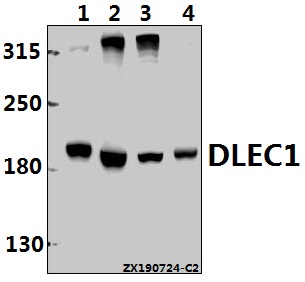Product Name :
DLEC1 polyclonal antibody Background :
Many tumor supressor genes are thought to reside on chromosome 3p because one copy of this region is frequently found to be deleted in several carcinomas. The gene encoding DLEC1 (deleted in lung and esophageal cancer protein 1), a 1,755 amino acid cytoplasmic protein, is located within a chromosomal region that is subject to abberations in many cancer cell lines and primary cancers. Reduced invasiveness and suppression of cell growth occurs when DLEC1 cDNA is introduced into a variety of cancer cell lines, suggesting that defects in the transcription of DLEC1 is a cause of lung, esophageal, and renal cancers. Evidence also suggests that methylation of the DLEC1 promoter may be associated with a poor prognosis in non-small cell lung carcinoma and nasopharyngeal carcinoma. With highest expression in kidney and prostate, there are three isoforms of DLEC1 that exist as a result of alternative splicing events. Product :
Rabbit IgG, 1mg/ml in PBS with 0.02% sodium azide, 50% glycerol, pH7.2. Storage&Stability :
Store at 4°C short term. Aliquot and store at -20°C long term. Avoid freeze-thaw cycles. Specificity :
DLEC1 polyclonal antibody detects endogenous levels of DLEC1 protein. Immunogen :
Synthetic peptide, corresponding to Human DLEC1. Conjugate :
Unconjugated Modification :
Unmodification
DLEC1 polyclonal antibody Background :
Many tumor supressor genes are thought to reside on chromosome 3p because one copy of this region is frequently found to be deleted in several carcinomas. The gene encoding DLEC1 (deleted in lung and esophageal cancer protein 1), a 1,755 amino acid cytoplasmic protein, is located within a chromosomal region that is subject to abberations in many cancer cell lines and primary cancers. Reduced invasiveness and suppression of cell growth occurs when DLEC1 cDNA is introduced into a variety of cancer cell lines, suggesting that defects in the transcription of DLEC1 is a cause of lung, esophageal, and renal cancers. Evidence also suggests that methylation of the DLEC1 promoter may be associated with a poor prognosis in non-small cell lung carcinoma and nasopharyngeal carcinoma. With highest expression in kidney and prostate, there are three isoforms of DLEC1 that exist as a result of alternative splicing events. Product :
Rabbit IgG, 1mg/ml in PBS with 0.02% sodium azide, 50% glycerol, pH7.2. Storage&Stability :
Store at 4°C short term. Aliquot and store at -20°C long term. Avoid freeze-thaw cycles. Specificity :
DLEC1 polyclonal antibody detects endogenous levels of DLEC1 protein. Immunogen :
Synthetic peptide, corresponding to Human DLEC1. Conjugate :
Unconjugated Modification :
Unmodification
-
 Western blot (WB) analysis of DLEC1 polyclonal antibody at 1:500 dilution Lane1:A549 whole cell lysate(30ug) Lane2:Hela whole cell lysate(40ug) Lane3:The Fallopian tube tissue lysate of Rat(40ug) Lane4:BV2 whole cell lysate(40ug)
Western blot (WB) analysis of DLEC1 polyclonal antibody at 1:500 dilution Lane1:A549 whole cell lysate(30ug) Lane2:Hela whole cell lysate(40ug) Lane3:The Fallopian tube tissue lysate of Rat(40ug) Lane4:BV2 whole cell lysate(40ug)
Bioworld Biotech only provide peptides for our antibodies and do not provide additional peptide customization services.
Price/Size :
USD 368/1mg/vial
Tips:
For phospho antibody, we provide phospho peptide(0.5mg) and non-phospho peptide(0.5mg).Describe :
Blocking peptides are peptides that bind specifically to the target antibody and block antibody binding. These peptide usually contains the epitope recognized by the antibody. Antibodies bound to the blocking peptide no longer bind to the epitope on the target protein. This mechanism is useful when non-specific binding is an issue, for example, in Western blotting (WB) and Immunohistochemistry (IHC). By comparing the staining from the blocked antibody versus the antibody alone, one can see which staining is specific; Specific binding will be absent from the western blot or IHC performed with the neutralized antibody.Formula:
Synthetic peptide was lyophilized with 100% acetonitrile and is supplied as a powder. Reconstitute with 0.1 ml DI water for a final concentration of 10 mg/ml.The purity is >90%,tested by HPLC and MS.
Storage:
The freeze-dried powder is more stable. For short time at 2-8°C. For long term storage store at -20°C.
Note :
This product is for research use only (RUO only). Not for use in diagnostic or therapeutic procedures.
 DLEC1 polyclonal antibody
DLEC1 polyclonal antibody  Datasheet
Datasheet COA
COA MSDS
MSDS SHIP
SHIP